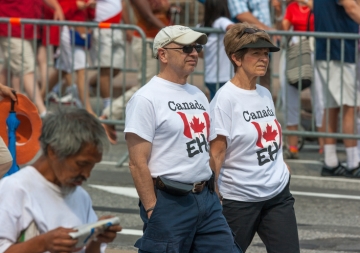New Application Process for Parent and Grandparent Program Revealed
 PGP to move from first-come, first-served to invitation-based system for 2017 application cycle
PGP to move from first-come, first-served to invitation-based system for 2017 application cycle
Pour lire cet article en français, cliquez ici.
The next application cycle for the popular Parent and Grandparent Program (PGP) for immigration to Canada will operate under a new processing system, whereby potential applicants have a window of opportunity to register their interest, but may only submit an application if invited to do so by Immigration, Refugees and Citizenship Canada (IRCC).
The PGP allows Canadian citizens and permanent residents to sponsor their parents and grandparents to immigrate to Canada as Canadian permanent residents.
Individuals who wish to sponsor their parent(s) or grandparent(s) will first be required to complete an online form indicating their interest in the program. This form will be available for a 30-day period beginning at 12 p.m. EST on January 3, 2017 and ending at the same time on February 2, 2017.
After this 30-day period, Immigration, Refugees and Citizenship Canada (IRCC) will randomly invite 10,000 individuals to submit an application. All individuals who submitted an online form will be notified whether they have been invited or not. Those who are not invited may indicate their interest in applying in 2018. Candidates who are invited to apply will have 90 days to submit a complete application, including all supporting documents. The range of supporting documentation may be extensive, including income taxation records, documents relating to civil status, and more. The 2017 application kit and guide will be available online as of January 9, 2017.
Moving away from first-come, first-served
Demand for spaces in the PGP has outpaced the supply of spaces within the quota since the program was re-introduced for 2014, and the quota is typically filled within days.
During the most recent intake period, which took place in January, 2016, more than 14,000 applications were submitted within three days, of which the first 10,000 complete applications were retained for processing. People seeking to bring parents or grandparents to Canada were reportedly paying large sums to couriers to ensure their applications were at the top of the pile for the first-come, first served program that was flooded with far more applications than available spots. Stakeholders were quoted as describing the process as a lottery, and the updated process for 2017 essentially turns what was an informal lottery with a very short intake period into a formal lottery with a 30-day window to submit a profile.
For the upcoming 2017 application cycle, based on previous demand levels it is expected that the number of potential applicants who submit an online form before February 2, 2017 will exceed the number of invitations available.
“We’re listening to what past applicants had to say and making the process fairer for people who want to sponsor their parents or grandparents. We’re ensuring everyone can access the application process by giving them the same chance to have their name chosen,” said Immigration Minister, John McCallum.
In the Immigration Levels Plan for 2017, the government of Canada established a target of 20,000 new permanent resident admissions to Canada through the PGP.
PGP eligibility criteria
It should be noted that the latest program update pertains to the application process, but does not change eligibility criteria.
Sponsors under the program must meet the following requirements:
- Be a Canadian citizen or permanent resident;
- Be 18 years of age or older;
- Meet the minimum necessary income level for this program by submitting notices of assessment issued by the Canadian Revenue Agency (CRA) in support of their sponsorship (sponsors in Quebec must satisfy particular income requirements, different from sponsors in the rest of Canada). Sponsors must also demonstrate they have met the minimum necessary income level for three consecutive years. If married or in a common-law relationship, the income of both persons can be included; and
- The sponsor and the sponsored relative must sign a sponsorship agreement that commits the sponsor to provide financial support for the sponsored person for up to 20 years. This agreement also states that the person becoming a permanent resident will make every effort to support themselves. Again, sponsors in Quebec have different requirements (see below).
Income requirements
Sponsors under the PGP are required to satisfy income requirements, which have been increased slightly since the most recent application cycle. Potential applicants are encouraged to review the latest minimum income requirements to ensure that they meet the requirements.
Sponsors in Quebec
The government of Quebec requires sponsors residing in that province to satisfy particular requirements. In addition to satisfying separate income requirements, Quebec residents must sign a sponsorship agreement with the province of Quebec; this is a contract binding the sponsorship for 10 years.
Sponsors in Quebec apply first to the federal government, which determines eligibility and completeness of the application at that level, before applying to the government of Quebec.
Potential sponsors residing in Quebec are encouraged to contact a legal expert about the exact requirements and processes required for PGP applications.
Super Visa
The PGP is not the only option for bringing parents and grandparents to Canada; there is also the Super Visa, a multiple-entry visa that allows parents and grandparents to enter Canada as long-term visitors. Super Visa holders may stay in Canada for up to two years on initial entry, and the visa is valid for up to 10 years. One advantage of this visa is the shorter processing time (as compared with a PGP application). However, Super Visa holders may not work in Canada, and the visa is not a permanent resident visa.
To find out if you or your family members are eligible for the Parent and Grandparent Program based on the eligibility criteria for the most recent application cycle, please fill out a free online assessment.
© 2016 CICNews All Rights Reserved
- Do you need Canadian immigration assistance? Contact the Contact Cohen Immigration Law firm by completing our form
- Send us your feedback or your non-legal assistance questions by emailing us at media@canadavisa.com







